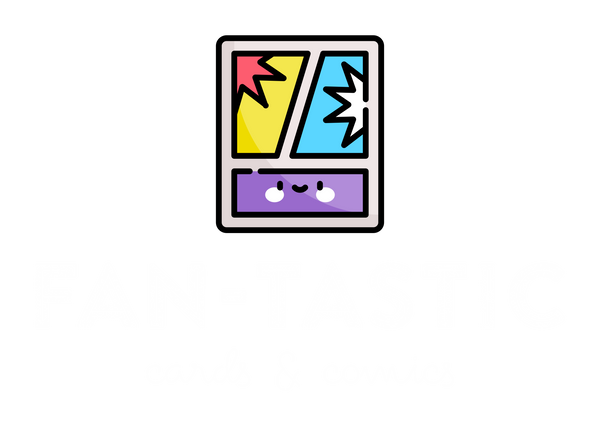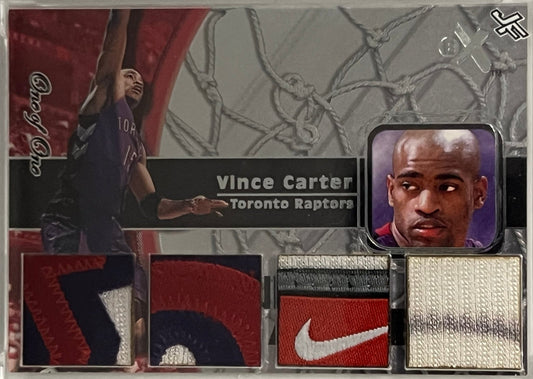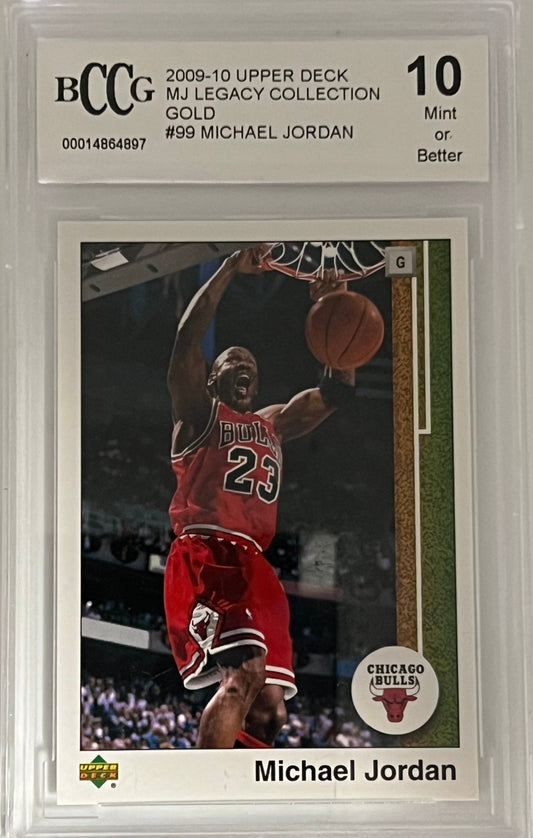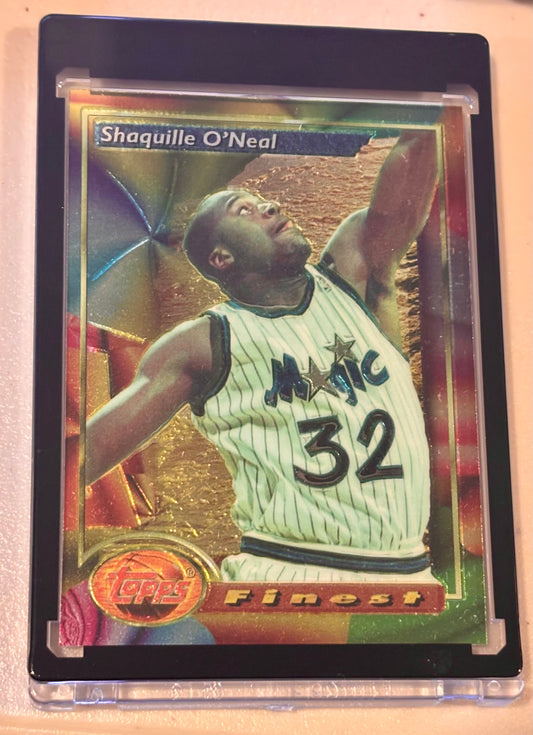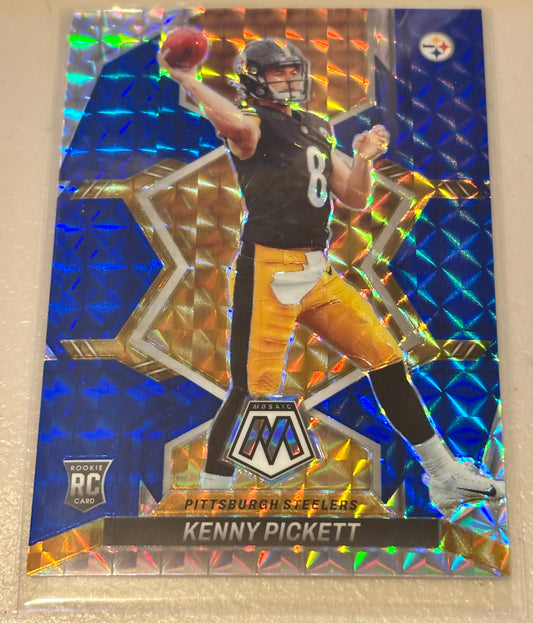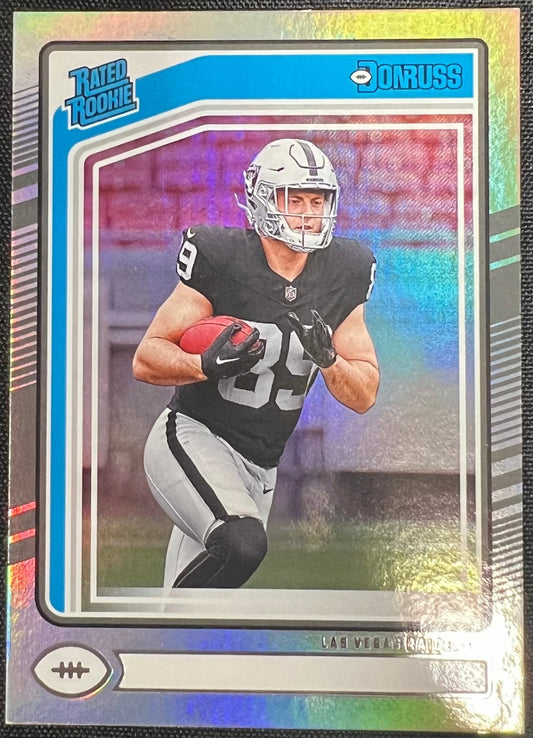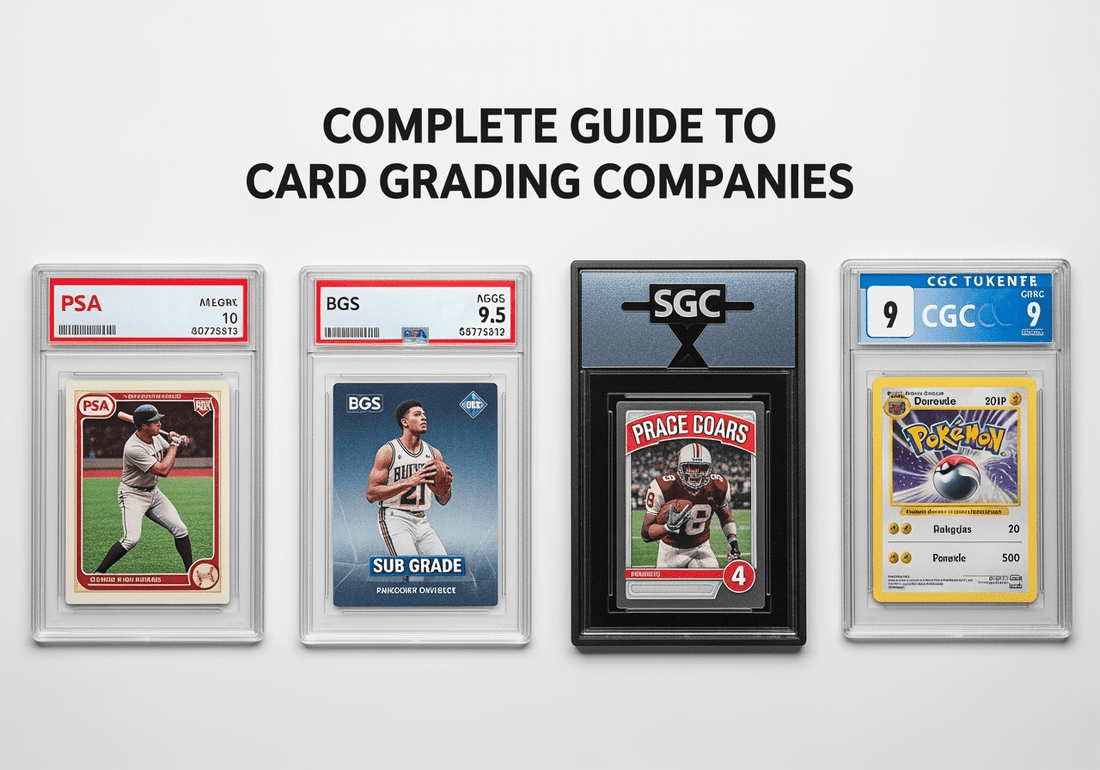
The Complete Guide to Trading Card Grading Companies
Share
The Complete Guide to Trading Card Grading Companies:
Which One Should You Choose?
Whether you're a seasoned collector or just starting your journey into trading cards, understanding card grading is essential for protecting and maximizing the value of your collection. At Fan-Tastic Cards & Comics, we help collectors navigate the world of graded cards every day, and one of the most common questions we hear is: "Which grading company should I use?"
What is Card Grading?
Card grading is the process of having your trading cards professionally authenticated and evaluated by third-party companies. These companies assess the condition of your cards using standardized criteria and encapsulate them in protective cases with assigned grades. This process provides several benefits:
- Authentication: Verification that your card is genuine
- Condition Assessment: Professional evaluation of wear, centering, corners, and edges
- Protection: Secure encapsulation that preserves the card's condition
- Market Value: Graded cards typically command higher prices than raw cards
The Major Grading Companies
PSA (Professional Sports Authenticator)
Founded: 1991
Grading Scale: 1-10 (with half-point grades for certain vintage cards)
Specialty: Sports cards, Pokémon, and other trading cards
Grading Scale: 1-10 (with half-point grades for certain vintage cards)
Specialty: Sports cards, Pokémon, and other trading cards
PSA is widely considered the gold standard in card grading, especially for sports cards and Pokémon. Their population reports are comprehensive, and PSA 10 cards typically command the highest premiums in the market.
Pros:
- Highest market recognition and resale value
- Excellent population tracking
- Strong authentication processes
- Clear, durable cases
Cons:
- Longest turnaround times (often 6+ months for standard service)
- Most expensive grading fees
- Strict grading standards can result in lower grades
Best For: High-value vintage cards, modern rookies, and Pokémon cards where maximum resale value is the priority.
BGS (Beckett Grading Services)
Founded: 1999
Grading Scale: 1-10 (with half-point increments)
Specialty: Modern sports cards and gaming cards
Grading Scale: 1-10 (with half-point increments)
Specialty: Modern sports cards and gaming cards
BGS offers subgrades for centering, corners, edges, and surface, providing detailed feedback on each aspect of the card's condition. They offer both "Pristine 10" grades (perfect 10 with subgrades of 9.5-10) and the coveted "Black Label" 10 (perfect scores in all four subgrade categories), which is considered the holy grail of modern card grading.
Pros:
- Detailed subgrade system
- Excellent for modern cards
- Black Label 10s command premium prices
- Generally faster than PSA
- Pristine 10s offer middle ground between regular 10s and Black Labels
Cons:
- Less market recognition than PSA for vintage cards
- More expensive than budget options
- Subgrades can be inconsistent
Best For: Modern sports cards, especially when you want detailed condition feedback or are targeting a Pristine or Black Label grade.
SGC (Sportscard Guaranty Corporation)
Founded: 1998
Grading Scale: 1-10 (whole numbers only)
Specialty: Vintage sports cards
Grading Scale: 1-10 (whole numbers only)
Specialty: Vintage sports cards
SGC has built a strong reputation, particularly for vintage cards. They're known for consistent grading and have gained significant market share in recent years.
Pros:
- Consistent, reliable grading
- Faster turnaround times than PSA
- Competitive pricing
- Growing market acceptance
- Excellent vintage card expertise
Cons:
- Less market premium than PSA for most cards
- Limited population data compared to PSA
- Newer company with less historical data
Best For: Vintage sports cards, collectors seeking consistent grading, and those wanting faster service than PSA.
CGC (Certified Guaranty Company)
Founded: 2020 (for trading cards)
Grading Scale: 1-10 (with half-point grades)
Specialty: Pokémon, gaming cards, and modern sports cards
Grading Scale: 1-10 (with half-point grades)
Specialty: Pokémon, gaming cards, and modern sports cards
CGC entered the trading card market in 2020, bringing decades of experience from comic book grading. They've quickly gained traction, especially in the Pokémon community.
Pros:
- Fast turnaround times
- Competitive pricing
- Experience from comic grading
- Growing acceptance in Pokémon market
- Good customer service
Cons:
- Newest company with limited market history
- Lower resale premiums compared to established companies
- Still building population databases
Best For: Pokémon cards, modern gaming cards, and collectors seeking fast, affordable grading.
HGA (Hybrid Grading Approach)
Founded: 2021
Grading Scale: 1-10 (with half-point grades)
Specialty: Modern cards with custom label options
Grading Scale: 1-10 (with half-point grades)
Specialty: Modern cards with custom label options
HGA offered unique custom labels and positioned itself as a more collector-friendly option with transparent grading processes. However, the company announced restructuring in 2024, creating uncertainty about their current operations and long-term viability.
Pros:
- Custom label options (when operational)
- Transparent grading videos
- Competitive pricing
- Fast turnaround times
Cons:
- Company restructuring creates uncertainty
- Limited market acceptance
- Questionable long-term viability
- Lower resale values
Best For: Currently not recommended due to operational uncertainty. Consider other options for new submissions.
Factors to Consider When Choosing a Grading Company
1. Card Type and Era
- Vintage Sports Cards (pre-1980): PSA or SGC
- Modern Sports Cards: BGS or PSA
- Pokémon Cards: PSA or CGC
- Gaming Cards: CGC or BGS
2. Your Goals
- Maximum Resale Value: PSA
- Detailed Condition Analysis: BGS
- Fast Service: SGC or CGC
- Budget-Friendly: CGC or SGC
3. Turnaround Time
- Fastest: CGC (weeks to 1-2 months)
- Moderate: SGC, BGS (2-4 months)
- Slowest: PSA (4-8+ months for standard service)
4. Cost Considerations
Grading fees vary by company and service level:
- Budget Options: CGC, SGC ($15-25 per card)
- Mid-Range: BGS ($20-40 per card)
- Premium: PSA ($25-50+ per card)
Note: Prices vary by service level and card value
Tips for Successful Grading
- Pre-screen Your Cards: Only grade cards that appear to be in excellent condition
- Research Population Reports: Check if your card is already heavily graded.
- Review Card Markets: Compare the market rate between various platforms, taking into account raw vs graded price.
- Consider Market Demand: Some cards perform better with certain grading companies
- Factor in Total Costs: Include grading fees, shipping, and insurance
- Be Patient: Quality grading takes time
Our Recommendation at Fan-Tastic
For most collectors, we typically recommend:
- PSA for high-value vintage cards and Pokémon where maximum resale value is important
- SGC for vintage sports cards when you want reliable grading with faster service
- BGS for modern sports cards, especially when targeting Pristine or Black Label grades
- CGC for Pokémon and gaming cards when speed and value are priorities
Getting Started with Grading
If you're new to grading, consider starting with a few lower-value cards to understand the process. Many collectors begin with CGC or SGC for their faster turnaround times and competitive pricing.
At Fan-Tastic Cards & Comics, we're always happy to help you evaluate whether your cards are good candidates for grading. While we don't grade cards in-house, our experienced team can provide visual assessments and help you understand what to expect from the grading process.
Ready to start grading your collection? Stop by Fan-Tastic Cards & Comics in Asheville, NC, or contact us for personalized advice on your specific cards. We're here to help you make the best decisions for your collection!
Visit us at fan-tasticshop.com or call (828) 505-0933 for more information.
